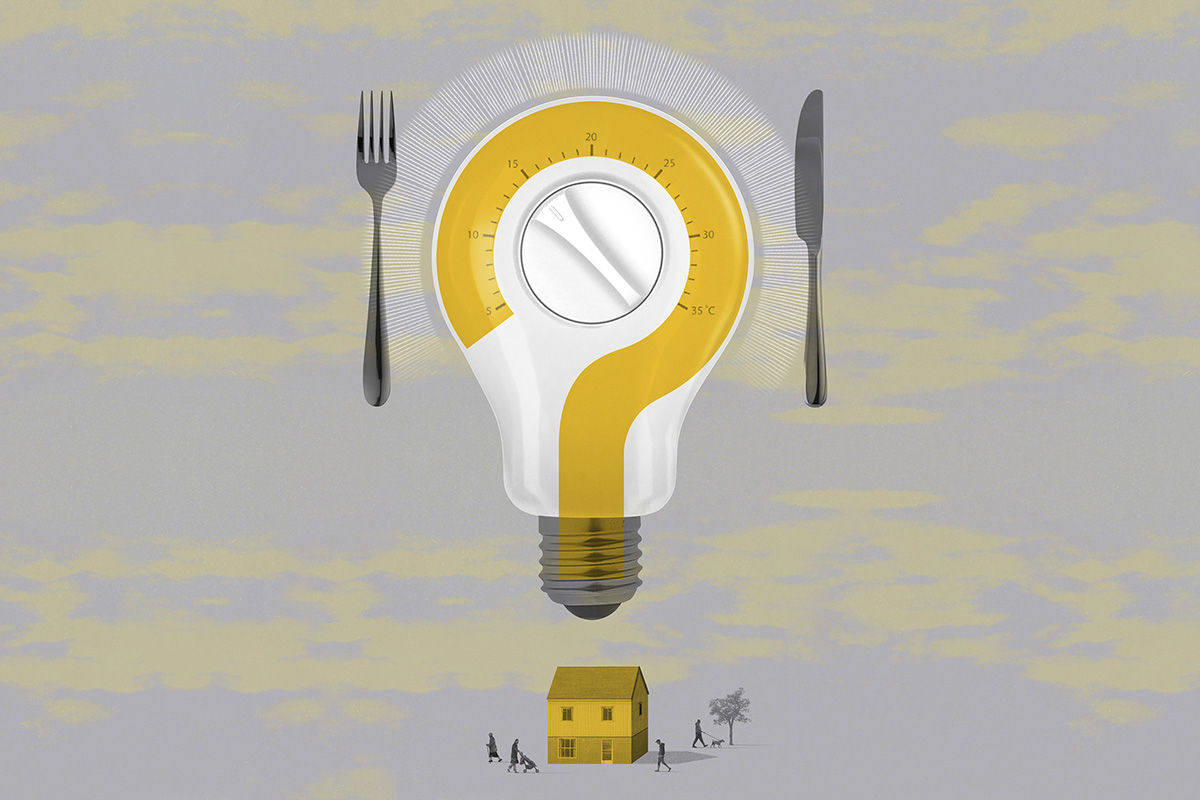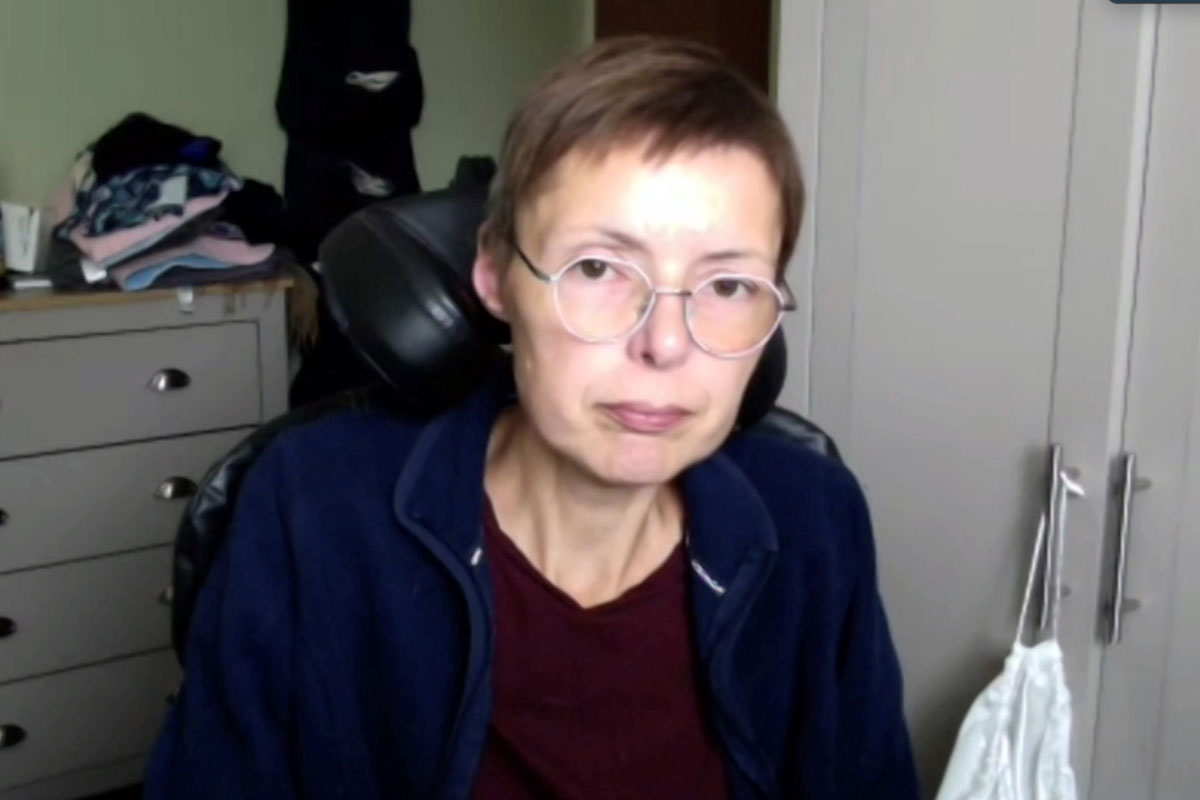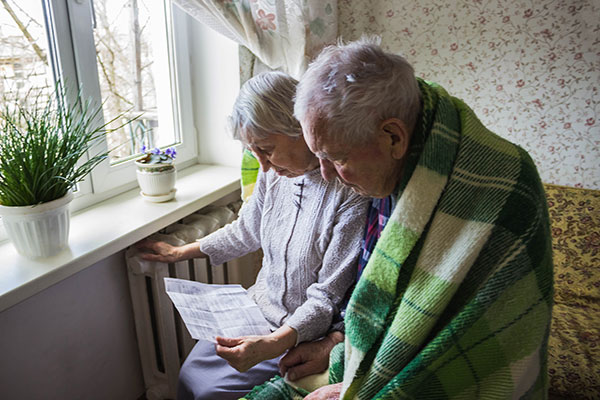Eating or heating? The UK’s huge fuel poverty problem and what social landlords want to do about it
More than three million households are in fuel poverty across the UK, with many facing desperate decisions. Home Group has been campaigning to end fuel poverty and earlier this year sat down with energy companies, MPs, researchers and campaigners to look at potential solutions. Martin Hilditch reports on the results. Illustration by Brett Ryder
The National Institute for Health and Care Excellence (NICE) gets straight to the point when talking about the danger posed by cold homes.
“For a vulnerable person, living in a cold home increases their chance of serious illness or death,” it states on its website.
“They are at higher risk of a heart attack or stroke, breathing problems, flu, depression and falls.”
In a world ravaged by the coronavirus pandemic, the scale of the health impacts are likely to be even greater. “A household that cannot afford to heat its home is likely to be under stress, for instance, from being forced to live in the only heated room,” according to NICE’s 2015 guidelines on “excess winter deaths and illness and the health risks associated with cold homes”.
The problem is absolutely vast. More than three million households – well over six million people – live in fuel poverty in England, according to the latest figures from the UK government. There are 613,000 households in fuel poverty in Scotland, 155,000 households in Wales and 128,000 in Northern Ireland. For an acknowledged killer, however, there is a peculiar lack of awareness about the issue. This is the first point made in the UK government’s fuel poverty strategy, published in February. “Few people self-identify as living in fuel poverty,” it states.
New research by housing association Home Group, which has been campaigning about fuel poverty, backs this up. It commissioned a YouGov poll, which found that only 55% of people knew what fuel poverty meant and 88% were unaware that more than six million people in the UK are trapped in its grip.
In order to galvanise action, Home Group pulled together representatives from key sectors, including politics, energy companies, housing, charities and research, in a debate chaired by Inside Housing (a few weeks before the government published its strategy).
Home Group chief executive Mark Henderson starts by pointing out that housing associations are unlikely to know the full scale of the problem in their own homes.
“You would naturally look for people perhaps in arrears or inconsistent rent payments as an indicator of fuel poverty – and it is. But people are equally likely to not buy food or not pay for energy because they are determined to pay the rent. I think that also over and above the people that we pick up, there is a significantly hidden number of people who are covering fuel poverty by, frankly, not eating.”
The meeting set out to identify what the next steps in tackling the problem should be and how the players in the room might look to contribute and collaborate to deliver change. This is what they came up with.
Issue one: awareness
The question on the day: how could the organisations in the room collectively use their voice to raise public consciousness of fuel poverty?
Suggestions:
This is a question that picks up on the success that Manchester United footballer Marcus Rashford had when campaigning about food poverty. As Mr Henderson states, at the moment the housing sector does not “have a Mr Rashford to step up and engage the wider community to talk about fuel poverty”.
For Adam Scorer, chief executive of national fuel poverty charity National Energy Action, clearer language and more direct campaigning is crucial. This may mean that the term ‘fuel poverty’ itself may be a problem.
“People shouldn’t necessarily know about the definitions and dynamics of fuel poverty as a term, but if you ask them about warm homes and warm homes as a precondition to a decent life, you will get a pretty good response,” he adds. “So I think there is part of this that needs to transition to the positive demand that warm, safe, affordable homes should be a right for everybody.”
Kate Henderson, chief executive of the National Housing Federation (NHF), says that Mr Rashford has “humanised an issue that affected him and done it in a really humble but human way… that has captured the public mood. The public gets this and they get the inequality of kids not being able to eat.”
For Ms Henderson the issue is “absolutely stark” as families are “making absolutely horrible decisions about whether to heat their home or feed their kids”. She adds that the NHF is “absolutely up” for supporting Home Group’s campaign. She also believes it is vital to have someone in government who is passionate about driving the issue up the agenda.
“We probably do need a senior politician in this government who champions this, because that does make a difference – having someone who is accountable in government, who can go and speak to the Cabinet around what we are doing and the progress we are making. Which is what happened as a result of some of the stuff going on with Mr Rashford. There are roles for all different types of leaders, but there does need to be some political leadership on this,” she explains.
Helpfully, we have a couple of senior politicians in this meeting. Could Mark Jenkinson, Conservative MP for Workington and who sits on the Business, Energy and Industrial Strategy Committee, be the champion Ms Henderson suggests is needed? How about it, Mr Jenkinson?
“I am certainly happy to be a champion,” he replies. “I’m not sure I’m the champion that Kate necessarily wanted when she talks about someone who can talk to cabinet and be accountable in government. That suggests more of a ministerial level.”
He suggests that the relevant minister would be Anne-Marie Trevelyan, who was appointed as minister for business, energy and clean growth shortly before this meeting. “I’m happy to take that up with Anne-Marie and find out what work is being done and what she is comfortable doing,” he adds.
The conversation will continue outside of this (virtual) room, then. But a door has been opened.
Aims of Home Group’s campaign to end fuel poverty
- To urge government to introduce a one-off COVID-19 winter fuel payment of £300 to each vulnerable household
- To urge energy providers to remove standing charges from the most vulnerable households immediately
- To urge energy providers to ensure a customer known to be on a higher tariff be moved to a better tariff
- Over the longer term to see energy providers prioritise those in social and affordable homes as part of its programme of switching to smart metering
- Government to work towards making the winter fuel payment targeted and extend the criteria beyond pensionable age to help the most vulnerable
- In the longer term, government to work with the sector and UK lenders so that innovative financing schemes can be delivered to increase the roll-out of commercial models of battery storage and rooftop solar panels, especially for social housing
Issue two: smart meter distribution
The question on the day: can social housing providers work with energy companies so tenants are prioritised for smart meter roll-outs, for example by confirming postcodes that stock is concentrated in?
Suggestions:
Whitehall’s fuel poverty strategy states that smart meters help consumers “better manage their energy use” and they can also help flag problems. Mr Henderson says: “When budgets are tight we need to make sure we are getting maximum impact and that means starting with those who need it most.” For him this means prioritising social housing tenants.
Trudy Harrison, Conservative MP for Copeland and parliamentary private secretary to the prime minister, says she wants to learn more about comparable fuel poverty problems. “In our area, thanks to Home Group, I think most if not all of those properties do have double-glazing, they do have insulation, they do have central heating, whereas many of the privately owned properties in our area will not.”
More immediately this is a question for the energy companies. Could they work more closely with social landlords on a targeted roll-out?
Tom Pakenham, director of policy and public affairs at OVO, says it is an issue he is keen to explore further. “But the starting point is that we want to install smart meters and if there’s a way we can work better with social housing providers, we’d definitely like to do that.”
Brian Tilley, head of external affairs at energy provider E.On, is similarly keen, although he says that “prioritisation” is the wrong way of looking at things.
“We want to engage with all customers here,” he states. “I have been engaging with our operations team around what can we do here for someone who lives in social housing, or any housing, that wants a smart meter to make sure that actually happens. Ultimately it comes down to being able to access the data and being able to design the operations in such a way that we can do that in a cost-effective environment.
“After this meeting, we will certainly be in touch with them just to see where things are [with regards to social housing]. We are open to ideas of how we can make this work. But I wouldn’t like to say it is prioritisation.”
Prioritisation or not, the meeting certainly creates an opportunity for further dialogue with two of the major energy companies about ways to set up a speedier roll-out in social housing.
Issue three: the roll-out of the fuel poverty strategy and how it links with other agendas
The question on the day: how can social landlords play a major part in the roll-out of the fuel poverty strategy? And how can fuel poverty be linked to other important agendas?
Suggestions:
Many of the participants make reference to the UK government’s wider target to decarbonise the economy by 2050. This could help with fuel poverty – for example with better designed housing – but there are also dangers that the two agendas could compete: if shifts from gas to electric result in bills going up, for instance.
For Brendan Sarsfield, chief executive of housing association Peabody, tackling poverty should be one part of a bigger plan anyway.
“Fuel poverty is a consequence of… poverty,” he states. “And we don’t really have an anti-poverty strategy. What we are seeing at the moment in the media with the Mr Rashford stuff is parts of poverty being exposed. And I think it is really important that we are exposing the consequences of poverty generally. Ultimately the goal should be anti-poverty strategies, not just anti-fuel poverty.”
“Destitution is on the rise,” he adds. “That is scary.”
There is certainly plenty of research into the problem, including work from the University of Bristol into the poverty premium (when low-income households pay more for essential goods and services).
Sara Davies, senior research fellow at the Personal Finance Research Centre at the University of Bristol, says its research raises real questions for the roll-out of the fuel poverty strategy, particularly in areas around consumer choice.
“The energy it takes to manage living in poverty means that there just isn’t the capacity to switch to be spending all your time trying to get the best deal, to even get the best in a way of heating your house,” she states. “So, any change really needs to be driven by housing providers, by government, or driven by gas suppliers. It is not reasonable to expect those who are, as I have said, spending so much energy just managing money and just managing life to add an extra layer of administration to them.”
Morgan Vine, head of policy and influencing at older people’s charity Independent Age, believes that the sector, government and energy companies should not be focusing all their attention on the long-term strategy – there needs to be immediate changes, too.
“There are a lot of people living in fuel poverty now in later life for whom those changes won’t be quick enough,” she states. “They can’t afford to heat their home right this second.”
Mr Henderson ends with a vow to continue the fuel poverty campaign. “It is not just government that needs to fix this,” he concludes. “We all have personal individual and organisational responsibilities to fix this. What I’m hearing gives me comfort going forward.”
Sign up for our care and support newsletter
Already have an account? Click here to manage your newsletters
Unlock Net Zero
Find out more on the practical reality of the transition to a net zero future at Unlock Net Zero.
Unlock Net Zero seeks to inform, educate, and connect people and organisations involved in adopting a net zero approach, identifying the technologies, infrastructure and behaviour change required.















